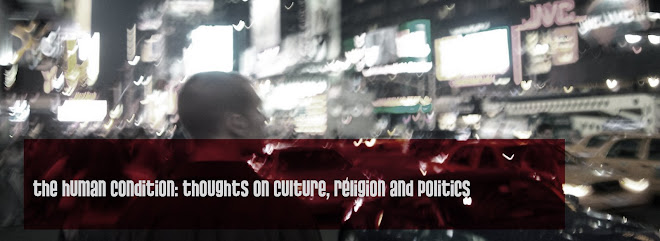The last part of the social organism is not a social institution, yet I think it might be the most important part; it is culture. Culture can be seen as the soul, the DNA or the genes of the social organism. Culture saturates and envelopes the SO, affecting it in every way. It is what the SO looks like; how it behaves; what it values and believes in etc... It is who the SO is at its core. This is why changing the morals, values and ethics of a culture-- because morals, values and ethics are cultural-- is the key to social change.
We tend to overlook the penetrating role culture plays in our lives. We regularly speak of freedom in this country, all the while forgetting how tremendously limited our freedom is. We are, in fact, products of our culture, and this truth is central to post-modern thought. So when one thinks of social change, it is imperative to note that true change only takes hold when there is cultural change. For instance, we may have outlawed slavery, but it still remained in the South in different forms for decades; and even after progress was made in the area of civil rights, harsh and abusive racism lingered on. Additionally, outlawing it didn't happen just on its own, as it may not have even been outlawed if not for huge developments in the economy which came through the industrial revolution. Yet still, religion also played a large role via the abolitionists and other religious movements, as well as, the civil rights movement as lead by Dr. King.
So slavery was defeated by different efforts and changes in different SI's, but one could argue that all of these efforts may have not been enough had they not changed the culture of the U.S. It was major generational shifts in attitudes towards racism that really solidified the progress made by civil rights leaders. And ultimately the religious hope of Dr. King's "I Have a Dream" speech drove, and continues to drive, our SO towards the reality of a post-racial America.
Culture can be seen not just simply as the water we swim in, but as a water that influences us in a multitude of ways, and that we have the power to influence as well.
The last observation I want to make is how culture interacts with relationship and religious hope. Thinking of culture as the soul of the SO makes incredible sense when we begin thinking about the transcendent feelings we get in church worship services, or political rallies, or sporting events. In those moments we tap into the soul, or culture, of a SO sharing the same religious hope as it, and feel like the strangers around us are as close as family. Our souls become one with the soul of the SO. The reality that we are part of one organism becomes an experience we feel deep in our bones.
Culture is the underlying force behind the behavior of the social organism. Imagine being able to extract the DNA from one person and inject it into another. If this were to occur, the individual's entire organism would be transformed. This is essentially what is possible with cultural change. The entire SO can change, and I think this truth is the key to maybe all of our social problems.

5 comments:
So what class are all the posts for? Feels like reading a term paper broken into sections...
not for a class, just thoughts bouncing around in my head a few weeks ago i wanted to put down in writing. but i'm bummed that it read like a term paper.
I guess I just assumed... you know what that does. :(
lol. wow heath, does using that joke count as swearing?
oh well, i was hoping to get feedback on those posts, so beggars can't be choosers.
What joke? :) I obviously meant that when you assume something that usually makes you wrong... Am I missing some obscene joke concerning the word "assume?" My mind simply doesn't have those kinds of thoughts floating around... I guess yours does. :P
Post a Comment